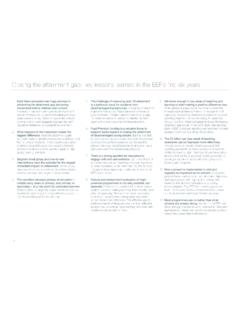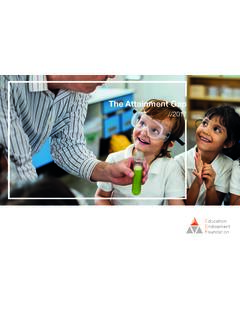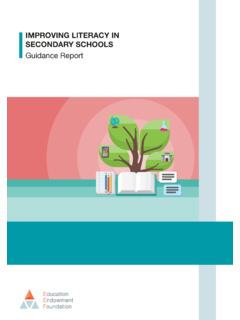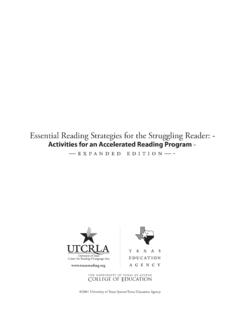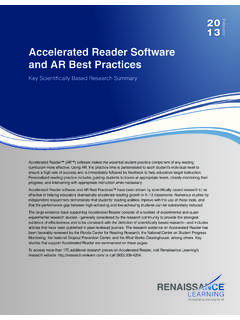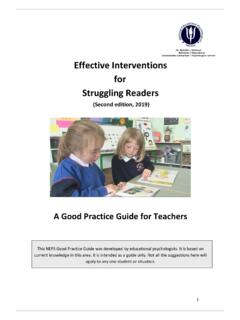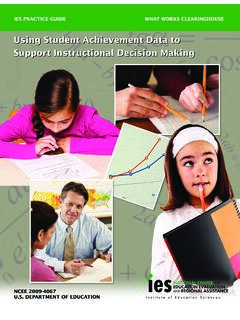Transcription of IMPROVING SOCIAL AND EMOTIONAL LEARNING IN …
1 Guidance ReportIMPROVING SOCIAL AND EMOTIONAL LEARNING IN PRIMARY SCHOOLSE ducation Endowment Foundation We would like to thank the many researchers and teachers who provided support and feedback on drafts of this guidance. In particular, we would like to thank the Advisory Panel and Evidence Review Team:Advisory Panel: Jonathan Baggaley (PSHE Association), Professor Robin Banerjee (University of Sussex), Professor Margaret Barry (National University of Ireland Galway), Dr Vashti Berry (University of Exeter), Jean Gross CBE (SEAL Community), Emma Lewis (Heathmere Primary School), and Liz Robinson (Big Education).Evidence Review Team: Dr Michael Wigelsworth, Lily Verity, Carla Mason, Professor Neil Humphrey, Professor Pamela Qualter (University of Manchester).
2 Authors: Matthew van Poortvliet (EEF), Dr Aleisha Clarke (EIF), and Jean Gross CBE (SEAL Community).About the Early Intervention FoundationThe Early Intervention Foundation (EIF) is a research charity and What Works centre established in 2013 to champion and support the use of effective early intervention to improve the lives of children and young people at risk of experiencing poor the Education Endowment FoundationThe Education Endowment Foundation (EEF) is an independent charity supporting teachers and school leaders to use evidence of what works and what doesn t to improve educational outcomes, especially for disadvantaged children and young SOCIAL and EMOTIONAL LEARNING in primary schoolsForeword 2 Introduction 3 What is SOCIAL and EMOTIONAL LEARNING (SEL)?
3 4 Summary of recommendations 8 Recommendation 1 Teach SEL skills explicitly10 Recommendation 2 Integrate and model skills through everyday teaching18 Recommendation 3 Plan carefully for adopting a SEL programme22 Recommendation 4 Use a SAFE curriculum: Sequential, Active, Focused and Explicit 26 Recommendation 5 Reinforce SEL skills through whole-school ethos and activities30 Recommendation 6 Plan, support, and monitor SEL implementation34 References 40 How this guidance was compiled 442 Education Endowment Foundation FOREWORDAsk any primary school teacher, and they will tell you that alongside the core business of teaching literacy and numeracy, a large and often unrecognised part of their job, involves addressing children s EMOTIONAL , SOCIAL and behavioural needs.
4 With the right support, children learn to articulate and manage their emotions, deal with conflict, solve problems, understand things from another person s perspective, and communicate in appropriate ways. These SOCIAL and EMOTIONAL skills are essential for children s development, support effective LEARNING , and are linked to positive outcomes in later , many schools feel that there s little time for developing such skills, given the pressure to improve attainment. Although all schools are expected to deliver Personal, SOCIAL , and Health Education (PSHE), it has not been a statutory requirement in the primary phase and in practice is often squeezed out. Few teachers receive support on how they can develop SOCIAL and EMOTIONAL skills in their mainstream teaching.
5 This is a missed opportunity because, when carefully implemented, SOCIAL and EMOTIONAL LEARNING can increase positive pupil behaviour, mental health and well-being, and academic performance. It is especially important for children from disadvantaged backgrounds, and other vulnerable groups, who on average have weaker SOCIAL and EMOTIONAL skills than their is why we have developed this guidance report. At a time when schools are reviewing their core vision and curriculum offer, and planning to implement statutory Relationships and Health education, this guidance offers six practical and evidence-based recommendations to support children s SOCIAL and EMOTIONAL development. It provides a starting point for schools to review their current approaches, and suggests practical ideas they can implement.
6 Importantly, it argues that such approaches can be woven into everyday class teaching without creating burdensome new programmes of work. To arrive at the recommendations, we reviewed the best available international research and consulted with teachers and other experts. We identified a group of core skills and strategies that occur frequently in SOCIAL and EMOTIONAL LEARNING programmes that have good evidence of impact, and suggest ways of embedding these in the classroom and international evidence in this area is extensive but knowledge of how best to implement it in English schools is not yet as strong as we would like, so an over-arching recommendation focuses on the importance of implementing and monitoring progress carefully, and the requirement for school leaders to prioritise this work if it is to have an impact.
7 Although some schools may feel SOCIAL and EMOTIONAL LEARNING is what we do already , the evidence suggests that how SEL is adopted and embedded really matters for children s with all our guidance reports, this publication is just the start. We will now be working with the sector, including through our colleagues in the Research Schools Network, to build on the recommendations with further training, resources, and guidance. And, as ever, we will be looking to support and test the most promising programmes that put the lessons from the research into practice. Sir Kevan CollinsChief ExecutiveEducation Endowment Foundation The evidence suggests that how SEL is adopted and embedded really matters for children s outcomes.
8 3 IMPROVING SOCIAL and EMOTIONAL LEARNING in primary schools3 INTRODUCTION This guidance provides recommendations on both structured programmes and everyday teaching practices. What does this guidance cover?This guidance report aims to help primary schools support children s SOCIAL and EMOTIONAL development. It draws on a recent review of the evidence about SOCIAL and EMOTIONAL LEARNING conducted by the University of Manchester, which was funded by the Education Endowment Foundation (EEF) and the Early Intervention Foundation (EIF). It also draws on a wider body of evidence and expert , most of the evidence regarding SOCIAL and EMOTIONAL LEARNING ( SEL ) is focused on intervention programmes with little guidance on the types of strategies or practices that teachers can integrate into their everyday teaching.
9 * The evidence review aimed to summarise what is known about the former, and to conduct new analysis on the latter, in order that this guidance can provide recommendations on both structured programmes and everyday teaching addition to the evidence review, the EEF and EIF commissioned a survey of what primary schools in England are currently doing to support children s SOCIAL and EMOTIONAL development. This information is used to provide context for the recommendations, and to identify where there are gaps between current practice and the evidence. More information about the report and how it was produced is provided at the end of this guidance report. Some key references are included for those wishing to explore the subject in more depth.
10 The full evidence review and survey will be published separately, and will contain more comprehensive methods and reference is this guidance for?This guidance is intended for primary schools. It is aimed primarily at senior leaders who are thinking about their school s approach to SOCIAL and EMOTIONAL LEARNING , and at Early Years, Key Stage 1, and Key Stage 2 class teachers. Further audiences who may find the guidance relevant include other staff within schools who are responsible for children s SOCIAL and EMOTIONAL development (for example, PSHE coordinators or inclusion leads), local authorities, multi-academy trusts, governors, parents, programme developers, and educational on the guidanceThe recommendations in this guidance report provide a starting point for school leaders to critically review how they support children s SOCIAL and EMOTIONAL development.
